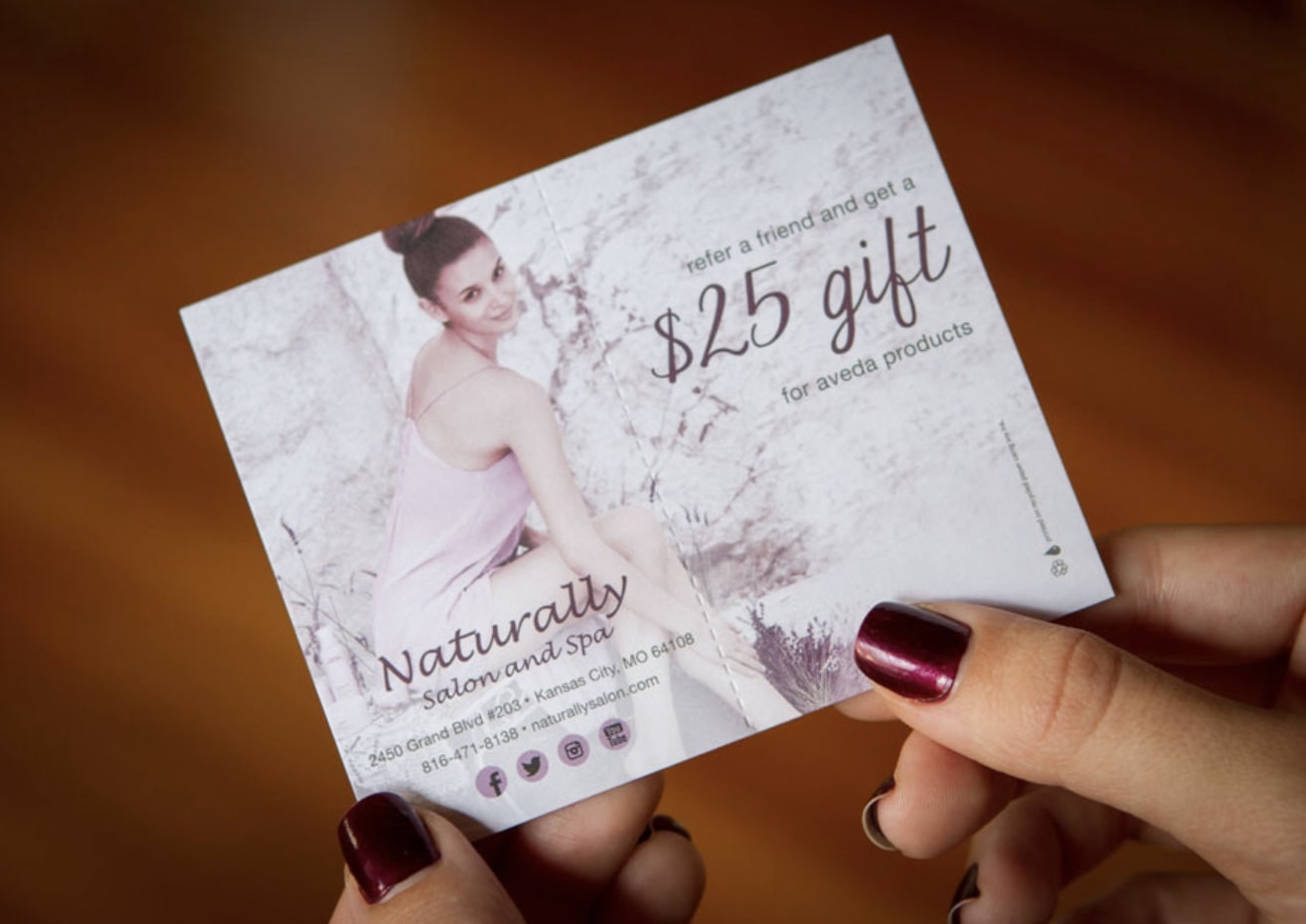When it comes to the services and products that matter most, consumers often look to the people they trust for recommendations: their friends and family.
Referral cards are a way to encourage that friend and family recommendations happen more often and more proactively. After all, your customers are already likely to refer your services to their friends and family. Why not make it easier (and lucrative) for them to do so?
Let’s take a look at eight companies that are already using referral cards and why they’re effective.
What is a referral card?
Referral cards are physical cards or flyers that companies give customers to share with friends and family. Printed on the card will be an incentive – such as a gift card, free services or cash – to participate in the program.
Essentially, referral cards are physical supplements to word-of-mouth marketing. Referred friends don’t have to remember the name of “that one place” they were told about last month because they’ll have that business’s card in their pocket. Plus, those referred friends will be much more likely to check out your business if there’s something in it for them (i.e., discounted products and services).
How do referral cards work?
Referral cards are typically handed out to customers onsite. For example, a salon might display their referral cards at the front desk or drop one in a customer’s bag with a receipt.
Either way, the process is straightforward. A company puts their referral cards into the hands of loyal customers. Written on that referral card is a reward the customer can earn for referring another customer to the business.
Some companies offer the referred friend an incentive to come in as well (such as 10% off their first purchase). But ultimately, referral cards work to attract new customers by leveraging peer-to-peer trust and recommendations.
8 examples of referral cards that work
Referral cards come in many different shapes and sizes. What you include on the card, along with what you’re offering as a reward for referrals, can make or break your program. Here are a few examples:
1. AVEDA

Aveda, a cosmetics company and hair salon, offers customers a $25 gift card toward salon products when they successfully refer a friend. The referred customer receives a $20 gift card toward new services at any Aveda salon.
According to Aveda Means Business, this referral card generates an average of 16-50 new clients per month for 6-to-10-chair salons.
Their program is effective because it offers an experience, and Aveda knows a single positive customer experience can turn newcomers into loyal customers. Had they offered referred customers a product instead of an experience, there’s a chance the referred customer might claim their reward and never return.
An experience, on the other hand, offers a chance to prove yourself as a business, to win over a potential customer.
2. YWCA
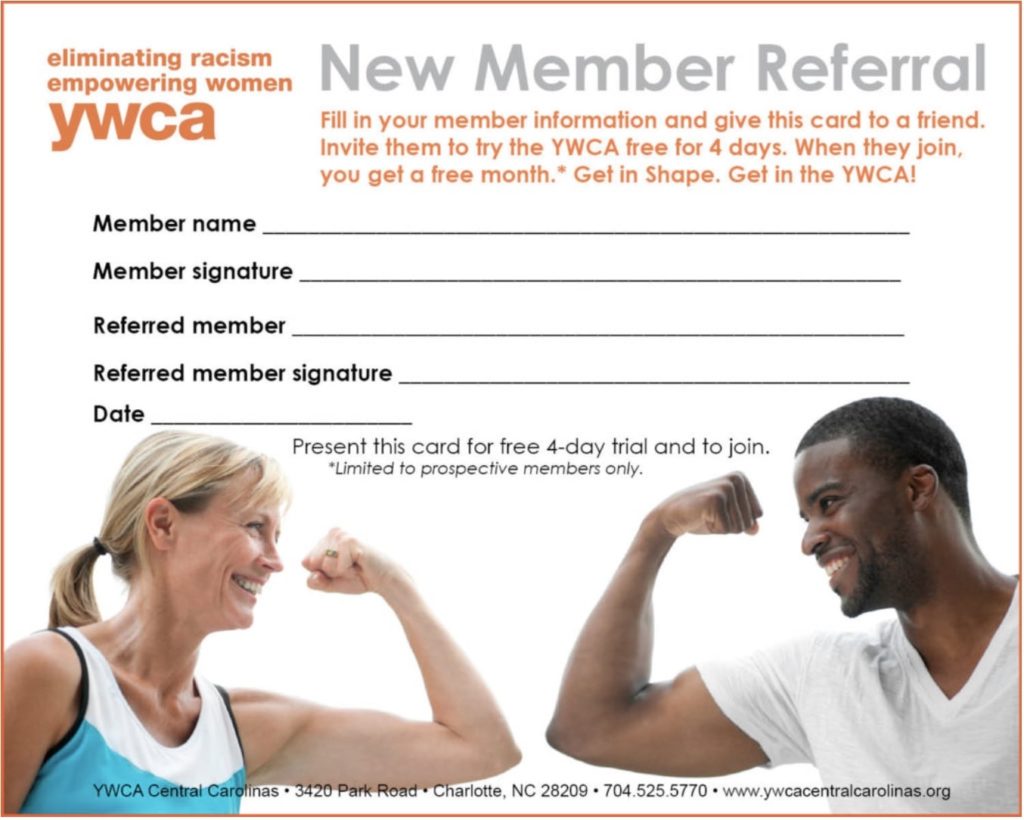
YWCA is a nonprofit organization that offers various programs and facilities – such as youth learning and fitness centers – to women and their families.
Customers who refer friends to the program using the referral card above receive a free month’s membership at the YWCA fitness center. Referred customers receive a free four-day trial of the facilities.
The great thing about this referral card program is that it’s easy to track and measure. For organizations like the YWCA that serve a large client base, name and signature lines help ensure the right customers are properly rewarded for their referrals. Signature lines also help verify that a referred customer was actually recommended by a real member and didn’t just happen upon a blank referral card. This makes the effectiveness of your referral card program much easier to measure.
3. KRAV MAGA WORLDWIDE (KMW)
KMW’s referral card program offers three tiers of rewards:
- $25 gift card for one successful referral
- $50 gift card for two successful referrals
- One free month of membership for three+ successful referrals
This type of tiered rewards system encourages more referrals without asking customers for too much, too quickly. For example, getting three+ friends to sign up for a membership might seem so unattainable to a customer that they don’t even try. One or two successful referrals, on the other hand, seem much more doable. Plus, multiple prizes based on the number of referrals gamifies the program by giving customers something to build toward.
4. PERFECTGYM
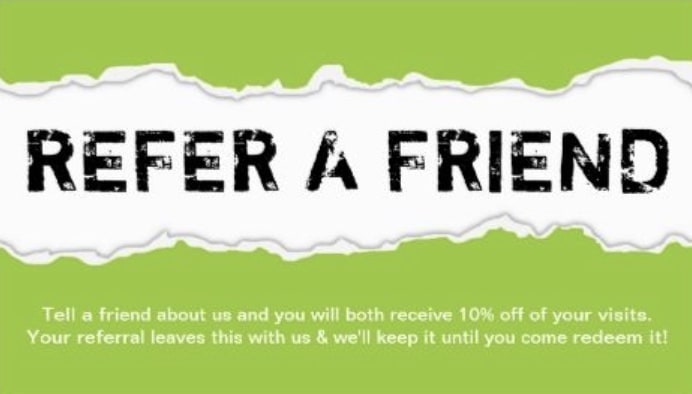
In this generic referral card example from PerfectGym, both the customer and referred friend get 10% off their next visit (wherever and whenever that may be).
The best part of this referral card is how easy it is for both the customer and the referred friend to use. There are no expiration dates to meet, and no signatures required for redemption.
Referral cards, like the example above, offer convenience, flexibility and benefits. And the more convenient a referral program is, the more likely customers and their friends are to participate.

Referral Marketing – The Best Practices You Need to Know
Written by veteran referral marketers, this guide will help you optimize your referral marketing program and supercharge growth.
Get the Guide5. BERNVILLE VET
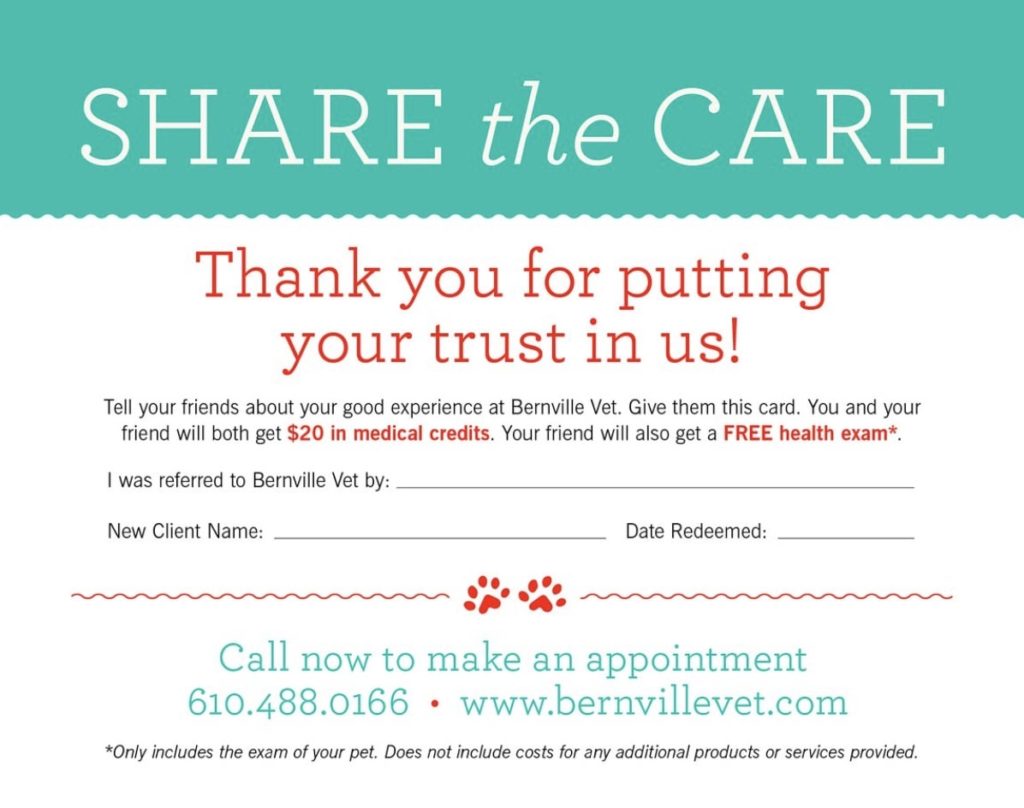
Bernville Veterinary Clinic offers customers and friends $20 in medical credits for participating in this referral card program. Referred friends will also receive a free health exam for their pet.
The free health exam gets new customers in the door without requiring them to spend any money or commit to any products. This way, just like Aveda, the vet can sell the referred friend on a positive experience and, ultimately, turn them into a loyal customer.
6. LA CHELÉ
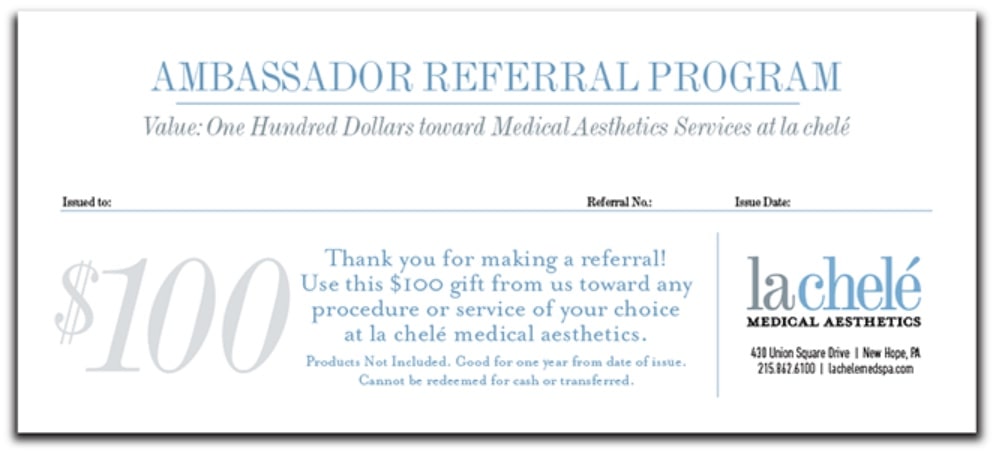
la chelé is a medical aesthetics spa and treatment center in Pennsylvania and New Jersey. Their referral card offers customers $100 toward a procedure or service for every referred friend who becomes a client.
This referral card is filled out by the customer onsite and remains there until redeemed. For customers, there’s no physical card to keep track of or hand out. All they have to do is encourage a friend to try one of the spa’s services. If the referred friend books an appointment and mentions the referring customer’s name, that customer earns the $100 gift card.
Participating in this referral card program requires little to no effort from the customer or referred friend. And for the customer, $100 is an attractively large sum of money to win, increasing the likelihood of that customer’s participation.
7. YUNIQUE MEDICAL
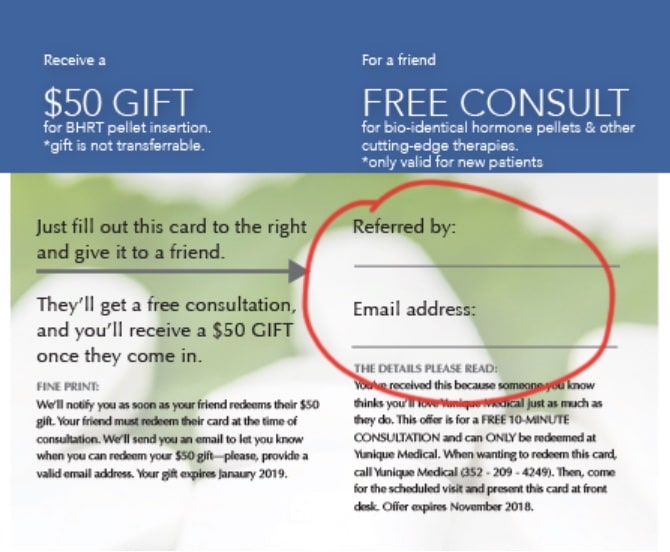
Yunique is a company that specializes in bioidentical hormone replacement. For every friend or family member who redeems one of Yunique’s referral cards, the referring customer gets their name entered in a raffle for free hormone therapy services. The customer also receives an additional $50 toward another procedure. Referred friends who participate in the program receive a free 10-minute consultation at the clinic.
Yunique tells customers and referred friends exactly what they can expect from the referral program by listing instructions and fine print on the referral card. And knowledge is power, so the more informed customers feel about your referral card program, the more comfortable they’ll feel participating in it.
8. BRACES AND SMILES
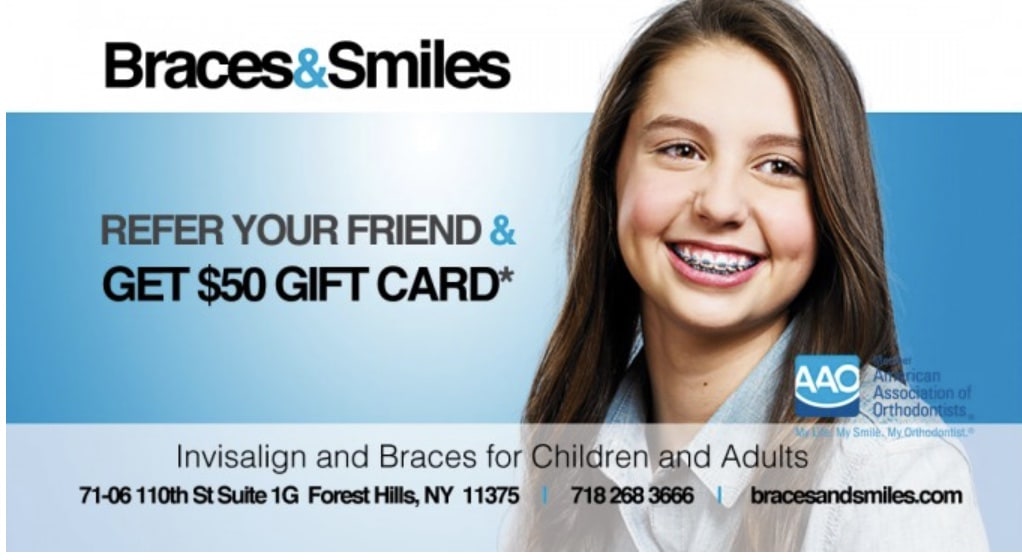
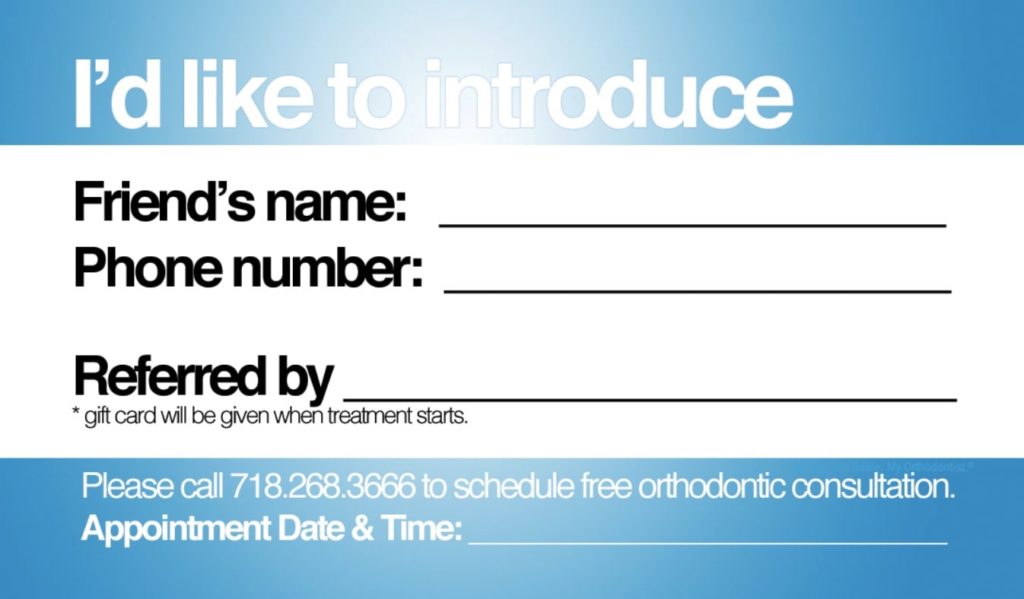
Braces and Smiles, an orthodontist office in Queens, NY, gives customers a $50 gift card toward products or services when they successfully refer a friend.
For customers, the great thing about this referral card program is that it requires little to no effort to participate in. Customers can fill out a friend’s information when they’re already at the office- and not think about it again.
And for the business, the benefit of this referral card is that they don’t have to rely on the customer to follow through. Employees can connect with the referred friend whenever and as often as needed to get an appointment scheduled.
Grow your customer base with referral cards
For businesses that provide onsite services, referral cards are a low-lift, inexpensive and easy-to-measure strategy for obtaining new customers.
Your employees don’t even need to interact with customers to encourage referrals. All they need to do is drop a referral card in a customer’s bag once they’ve made a purchase or display them at the front desk.
Your customers are already likely to recommend your services to a friend who asks for advice. Referral cards simply make it easier and profitable for customers to do so proactively.
